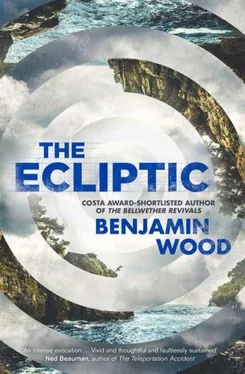‘You should ask Quickman to translate it for you. He wrote a whole book about—’ I stopped, realising that the boy was several moves ahead of me. ‘Japan,’ I finished pointlessly. ‘But you knew that already.’
The boy softened his stance. ‘Well, I don’t think he’d help me now anyway. Not after last night. I shouldn’t have bothered asking you to find him.’
‘Oh, don’t worry about that — Q doesn’t bear a grudge for long. Even if you did give him a thrashing.’ I did not sound very convincing. ‘Why don’t you sit with us at dinner? You can ask him then. Or I’ll do it for you.’
‘Maybe,’ the boy said. ‘I’ve got a lot to finish here.’
‘You can’t afford to keep missing meals, you know. It’s bad for the brain.’
‘I’m fussy when it comes to food.’
‘Well, it’s Monday, so it’s probably karnıyarık.’
‘I don’t even know what that is.’
‘Now you’re sounding like a proper Englishman,’ I said. ‘Think aubergine and minced meat. It’s always good when Gülcan makes it. Shall I save you a space?’
‘OK. But I might have to skip it.’
‘I’ll lean on Quickman for you in the meantime.’
‘Thanks.’
‘Just tell me one thing, for my own peace of mind,’ I said. ‘Are you really a musician?’
The boy snickered. ‘I always thought I’d like to be,’ he replied, and went back to his crate. ‘But, no — it’s not why I’m here.’ Sitting down, sighing, he unfurled the spine of cards over his knees and blew on the nib of his pen. He glared at me until I moved away.
Quickman loaded his plate with rice and karnıyarık and continued along the serving pass. He reached into the bread basket and collected four thick sections, stacking them on his tray like casino chips. He offered me a fifth but I shook my head. ‘And what makes the lad think I’m such an expert on it?’ he said, adding the slice to his own pile. ‘If languages were my speciality, I’d be translating Balzac, not piddling about with my own rubbish. Want some ayran ?’ Again, I shook my head. Quickman was the only one of us who could stand to drink the stuff — a yoghurt gloop with all the flavour and viscidity of a saline drip. ‘You don’t know what you’re missing out on. It’s a little brackish, at first, but you get used to it. Great for the digestion.’
‘I’ll live with the heartburn,’ I said. ‘Pass the juice.’ He handed me the jug and waited as I filled a glass, peering towards our usual table.
The problem was, I understood the boy’s reasons for thinking Quickman could help, but the explanation was not easy to broach with the man himself. An age had passed since I had closed the covers on In Advent of Rain. I could still remember the story and its characters in some detail because it was that rare type of novel — disquieting, note-perfect — that settles in your unconscious and becomes hard to disentangle. I knew that a solemn, friendless boy like Fullerton could not have survived his adolescence without reading it, too. But how could I raise the subject of the book with Quickman? For me to have even hinted at its existence would have been to acknowledge his life before Portmantle, to subject him to a reality he had chosen to renounce.
In Advent of Rain tells the story of an unnamed girl whose summer is disturbed by the arrival of a visitor from Japan: an old acquaintance of her father’s called Junichiro. It is 1933 and Junichiro, an esteemed mathematician from Nagoya, has come to England to embark on a lecture tour, arranged by the girl’s father, in order to propagate an extraordinary claim. The old man believes he has discovered a formula that can predict when rain will fall on any given day, in any given place — knowledge that he believes will be vital to agriculture and the growth of a global economy in the future. He is keen to share the formula with governments across the world, under certain conditions. Junichiro cannot speak much English, so the girl’s father — a linguist and a don at an Oxford college — acts as an interpreter. The girl spends her summer holiday following them on the lecture tour, going from one university hall to another, by road, by rail, by sea. At each venue, Junichiro pins up a sheet of predictions for rainfall times and locations that later reveal themselves to be accurate. His claims gather weight and interest from the media. Lecture halls are no longer big enough to hold the audiences, so the tour is extended to theatres in Ireland, France, Germany, and America. But, despite offers of employment and financial reward from private companies, Junichiro refuses to divulge the formula. The press speculates that he is planning to auction off the information to the highest bidder. Junichiro tells the girl’s father, however, that he will only reveal the formula if the US government agrees to end its development of atomic weapons. They meet with American officials, who deny that such technology exists. The night before Junichiro is to give a lecture in Munich, he is abducted from his hotel and is never seen again. Just a few months later, the girl’s father poisons himself in rather suspicious circumstances, and she is sent to live with her aunt in Devon. She spends the rest of her life — through wartime and peacetime — trying to find out what happened to Junichiro and her father, without success, until one day a photograph of the old man’s formula is discovered on an undeveloped roll of negatives, found in the archives of her father’s college. Now a teacher of mathematics in her own right, she reads through the old man’s workings and finds them irrefutable. But the world has become a different place, bleak and bruised by war. So, instead of publishing the formula or spreading word of Junichiro’s accomplishment, she bleaches the negatives and burns the photographs, and — in a final touch of poetry — goes out in the rain to bring in her husband’s washing.
Quickman rarely discussed any aspect of his writing with us, and for me to have gone blundering into a conversation about it, unprompted, would have been to risk our friendship. As we carried our dinner trays to the table, I tried to think of some way to introduce the topic of Japan again without expressly mentioning his book. But my thoughts came jabbering out too fast: ‘So, let’s just imagine, hypothetically, if somebody were to give you a letter from a friend of hers in Japanese, you wouldn’t, let’s say, be able to determine if it was really Japanese, or Korean, or something similar?’
Quickman walked ahead of me. ‘What?’
‘I’m saying, I don’t think I’d be able to tell the difference between any of those Oriental languages. Never been that far east in my life. All the characters look so complicated, and there must be so many to remember, and I’d probably have to—’
‘Stop it, Knell,’ he said. ‘I can see what you’re doing, and I would very much like you to stop it. Immediately’ He placed his tray down beside Pettifer, who was keenly scooping up the dregs of his karnıyarık with a crust of bread. The light was faltering outside and the mess hall was moody with candle flames.
I went quiet.
‘What’s she trying to talk you into?’ asked Pettifer, grabbing the tail of our conversation. He looked at me. ‘Let me guess: that boy’s got in your head again.’
‘Keep out of it,’ I said.
Quickman tore the cap from his ayran and took a gulp. When he lowered the pot, there was a milk-white film on his moustache. ‘What I don’t quite understand,’ he said, padding off the liquid with a napkin, ‘is why you feel so obliged to help the lad. He doesn’t even have the good grace to show up for dinner. Not to mention the fact that he hustled me out of my father’s lighter. I’d quite like that thing back, by the way. But that’s not the point. I’m not going to get dragged into someone else’s creative problems. I’ve got enough of my own.’
Читать дальше












